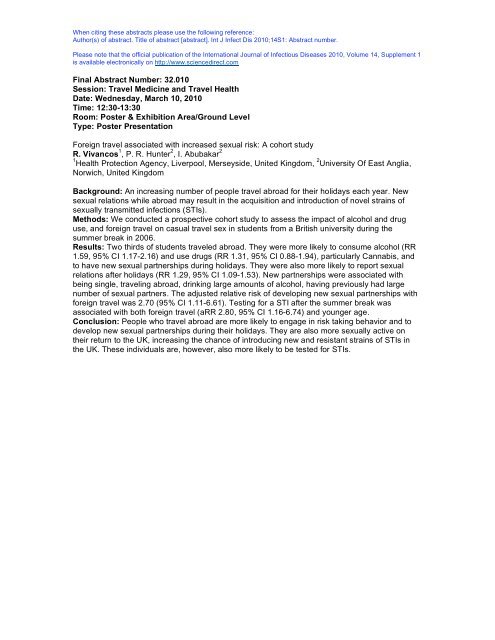14th ICID - Poster Abstracts - International Society for Infectious ...
14th ICID - Poster Abstracts - International Society for Infectious ...
14th ICID - Poster Abstracts - International Society for Infectious ...
Create successful ePaper yourself
Turn your PDF publications into a flip-book with our unique Google optimized e-Paper software.
When citing these abstracts please use the following reference:<br />
Author(s) of abstract. Title of abstract [abstract]. Int J Infect Dis 2010;14S1: Abstract number.<br />
Please note that the official publication of the <strong>International</strong> Journal of <strong>Infectious</strong> Diseases 2010, Volume 14, Supplement 1<br />
is available electronically on http://www.sciencedirect.com<br />
Final Abstract Number: 32.010<br />
Session: Travel Medicine and Travel Health<br />
Date: Wednesday, March 10, 2010<br />
Time: 12:30-13:30<br />
Room: <strong>Poster</strong> & Exhibition Area/Ground Level<br />
Type: <strong>Poster</strong> Presentation<br />
Foreign travel associated with increased sexual risk: A cohort study<br />
R. Vivancos 1 , P. R. Hunter 2 , I. Abubakar 2<br />
1 Health Protection Agency, Liverpool, Merseyside, United Kingdom, 2 University Of East Anglia,<br />
Norwich, United Kingdom<br />
Background: An increasing number of people travel abroad <strong>for</strong> their holidays each year. New<br />
sexual relations while abroad may result in the acquisition and introduction of novel strains of<br />
sexually transmitted infections (STIs).<br />
Methods: We conducted a prospective cohort study to assess the impact of alcohol and drug<br />
use, and <strong>for</strong>eign travel on casual travel sex in students from a British university during the<br />
summer break in 2006.<br />
Results: Two thirds of students traveled abroad. They were more likely to consume alcohol (RR<br />
1.59, 95% CI 1.17-2.16) and use drugs (RR 1.31, 95% CI 0.88-1.94), particularly Cannabis, and<br />
to have new sexual partnerships during holidays. They were also more likely to report sexual<br />
relations after holidays (RR 1.29, 95% CI 1.09-1.53). New partnerships were associated with<br />
being single, traveling abroad, drinking large amounts of alcohol, having previously had large<br />
number of sexual partners. The adjusted relative risk of developing new sexual partnerships with<br />
<strong>for</strong>eign travel was 2.70 (95% CI 1.11-6.61). Testing <strong>for</strong> a STI after the summer break was<br />
associated with both <strong>for</strong>eign travel (aRR 2.80, 95% CI 1.16-6.74) and younger age.<br />
Conclusion: People who travel abroad are more likely to engage in risk taking behavior and to<br />
develop new sexual partnerships during their holidays. They are also more sexually active on<br />
their return to the UK, increasing the chance of introducing new and resistant strains of STIs in<br />
the UK. These individuals are, however, also more likely to be tested <strong>for</strong> STIs.
















